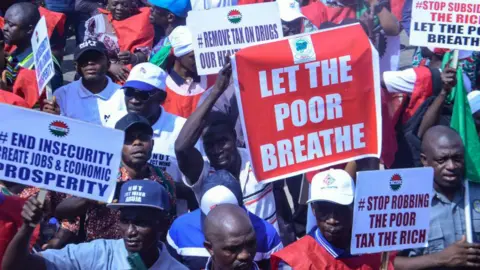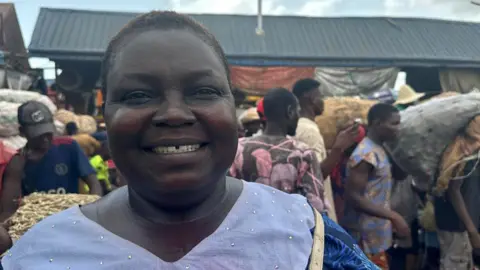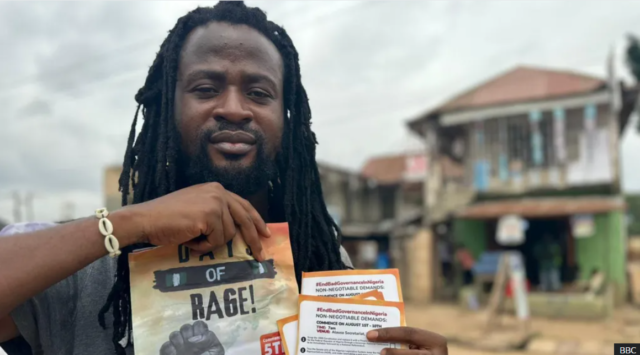“We are protesting because we are hungry,” Nigerian activist Banwo Olagokun tells the BBC.
He is part of the Take It Back Movement, one of the groups that has called for 10 days of protest from this Thursday – despite pleas from the government to stand down.
“We are protesting because the inflation rate has made us to not be able to afford the simple things of life – food, water, clothes, medicals,” Mr Olagokun, 36, adds.
Nigeria is experiencing its worst economic crisis in a generation. Annual inflation is at 34.19% – its highest in almost three decades. Food prices have risen even faster – for example, in the commercial hub, Lagos, yams are almost four times more expensive than last year.
People often say that Nigerians are resilient and they adapt quickly to the changing circumstances.
In recent months some have opted for nearly rotten tomatoes, cheaper, lower-grade rice and fewer meals to get by. But it is not clear where the breaking point is.
The Take It Back Movement wants the government to tackle the cost-of-living crisis, and to also offer free education at all levels.
“We are just demanding for the reversal of the things that are making things expensive,” Mr Olagokun says.
Some of Take It Back Movement’s more radical demands include scrapping the country’s 1999 constitution, allowing Nigerians living abroad to vote in elections and releasing the Biafran separatist leader Nnamdi Kanu from prison.
The national co-ordinator of the movement, Juwon Sanyaolu, 31, says it has partly drawn inspiration from recent events in Kenya, where youth-initiated demonstrations forced President William Ruto to scrap a controversial tax-rise plan.
He says the demands of the Nigerians planning to demonstrate are realistic and could lead to similar change.
“If Kenyans were calling for the dissolution of [President William] Ruto’s cabinet, I’m sure people would have been saying, ‘Your goals are unrealistic’. But today they’ve dissolved the entire cabinet,” Mr Sanyaolu says
“They’re only exercising democracy,” he adds.
 Getty Images
Getty ImagesThe planned protests have commanded the Nigerian government’s attention.
In recent days cabinet ministers have held two emergency meetings to discuss how to respond.
President Bola Tinubu made an appeal through Information Minister Mohammed Idris Malagi, asking organisers to shelve the plan and urging them to be patient.
“The young people out there should allow the president more time to see to the realisation of all the goodies he has for them,” he said.
Several state governors have also spoken out in an effort to deter people from taking to the streets, warning of violence.
Abia state Governor Alex Otti said young people should “think about the implications of pouring out onto the streets”, warning it might cause more harm than good.
Over the last week, government agencies have made various announcements that to many appear to be concessions to appease the public.
They include re-opening applications for young people to receive financial support to start or expand their businesses.
The state oil company, the Nigerian National Petroleum Corporation, put a call out for job applicants, leading to its website crashing.
Protest organisers say the government’s offers are not enough and have instead further fuelled their desire to rally for change.
“We have not put our boots on the ground and already the government is granting concessions and advertising jobs here and there,” Mr Sanyaolu says.
“If young people insist and put their boots on the ground, we’ll get more.”
Nigeria’s economic difficulties can be linked to three main things – firstly, a government policy that ended the pegging of the value of the currency, the naira, to the US dollar.
The move was designed to encourage foreign investment, but it caused the naira to plunge in value by around 70%, contributing to inflation.
Secondly, the removal of a subsidy on fuel was aimed at cutting government expenditure, but sent pump prices soaring with a ripple effect on other goods.
And thirdly, the economy has also felt the aftershocks of a security crisis, with rampant kidnappings and attacks across the country, affecting supply chains and driving up costs.
The state of the economy has, in the eyes of many, marred President Tinubu’s first year in office.
However, the government has insisted the reforms were necessary to reduce public spending, something economist Muda Yusuf agrees with, but believes they were not carefully planned for.
“The policies were inevitable because the economy was almost at the brink at the time the current administration took over. Our debt level had increased significantly,” he says.
“What I think the president could have done differently is to roll out these mitigating measures to cushion the outcome of the policies more quickly.”
The “mitigating measures” the government put in place include distributing 40,000 tonnes of grains from the national reserve and giving temporary cash payments to the very poor.

The crisis has led to businesses suffering.
A caterer in Lagos, Abosede Ibikunle, says her regular customers are now opting to cook their own food for events.
“Everything is costly. Nothing is cheap. People are suffering, people are dying, this hardship is too much.”
There are some who fear that demonstrations could lead to a repeat of the West African nation’s last mass protest by young Nigerians four years ago.
What had started as unhappiness in 2020 about the brutality of the police’s now-disbanded Special Anti-Robbery Squad (Sars) became a conduit for young people to vent their anger.
The demonstrations, dubbed #EndSars after the protesters’ rallying hashtag on Twitter (now X), ended abruptly after two weeks when members of the armed forces opened fire during a demonstration in Lagos.
President Tinubu’s daughter, Folasade Tinubu-Ojo, has warned market traders in Dosunmu, Lagos, to prevent their children from protesting now, citing the violence that occurred at that time.
“Let’s tell ourselves, family, and children that there is nothing like protest in Lagos. It is a gimmick to destroy the country… look at how they burnt government properties. Can you see that they are fighting against us?”
Defence spokesman Maj Gen Edward Buba has warned that the country’s military will intervene to prevent any violence at the protests, while police chief Kayode Egbetokun blamed “self-appointed crusaders and influencers” as being behind them.
Organisers have called the warnings of violence a smokescreen for a potential crackdown by the government, saying it will not put them off.
“I’m not a prophet, as I like to say, but one thing I can assure is Nigerians are resolute and we will protest,” Mr Sanyaolu declares.
“The protesters have nothing to lose but their chains,” he adds, referencing Karl Marx.
He then cited a hymn: “A man who is down, is not to be afraid of falling. We are down already, so we have lost our fear.”







